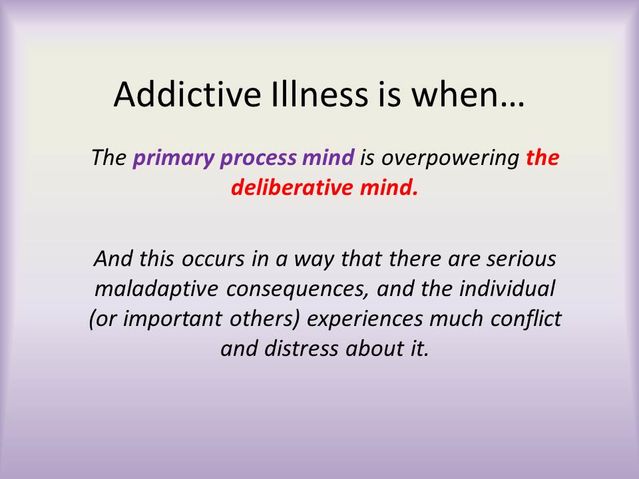Addiction
Is Addiction a Disease of the Brain?
A psychological analysis of the concept of addiction.
Posted November 10, 2017
This blog is based on a portion of a talk I gave on a conference held at James Madison University on the Opioid Epidemic. In the interest of length, I focus here only on how to understand addiction from my perspective as a health service psychologist who operates from a unified framework of psychology and psychotherapy. I will not dive into other areas covered in the presentation, such as who tends to become addicted and how people trapped in such addictive patterns change, perhaps elaborating on that in another blog later.
Is Addiction a Disease?
We can start with one of the first questions that emerges in dealing with addiction, which is the question of whether or not it is a disease. The National Institute of Drug Abuse is clear in their opinion that addiction is a disease. They write, “Addiction is defined as a chronic, relapsing brain disease that is characterized by compulsive drug seeking and use, despite harmful consequences. It is considered a brain disease because drugs change the brain; they change its structure and how it works. These brain changes can be long lasting and can lead to many harmful, often self-destructive, behaviors”.
However, not everyone agrees. For example, Psychology Today blogger and addiction expert Stanton Peele rejects this view completely, writing, “Every major tenet of the “disease” view of addiction is refuted both by scientific research and by everyday observation. This is true even for alcoholism and drug addiction, let alone the many other behaviors that plainly have little to do with biology and medicine.”
From my perspective, to approach this issue with a clear head, we need to understand the concept of a person, and the makeup of the human mind. Understanding these elements gives rise to “dual motive conflict theory”, which paints a clearer picture of what addiction is. From there we can see why addiction is a powerful, problematic habit and not a prototypical "disease", but why in the most extreme circumstances it might be useful to characterize it as such, as it becomes beyond the control of the deliberative person.
The Concept of a Person and the Architecture of the Human Mind
It might seem strange to include discussions about the concept of a person in understanding what an addiction is, but it turns out this is crucial. The essence of a person is a self-conscious, deliberative actor whose actions line up in accordance with the choices one makes. For example, my deciding to write this blog and your decision to read it and mull it over are exemplars of people behaving as people.
Although adult human beings are generally thought of as behaving as people, some reflection reveals that there are examples of “behaviors” of human beings that are not really exemplars of people behaving as people. For example, once when I was a teenager I was given some medicine that had an odd side effect. It would cause me to awake in the middle of the night in the midst of a night-terror, which I would continue to live out. So, one night I burst into my parents’ bedroom, having “witnessed” a horrible plane crash involving kindergarteners for whom I was somehow responsible. In response to his horror, in my delusional, dream-like state of altered consciousness, I felt enormous guilt and pulled off my headgear from my braces and started to plunge the metal prongs into my eyes in an effort to blind myself from the horror. Thankfully, my parents quickly responded and physically restrained me and over the next 10 minutes or so, I woke up. In this altered state, I was not a person acting as a person in the normal sense of the word. Rather, I was temporarily insane. I was back to being me, behaving as a person only as “I” woke up.
An analysis of human mental architecture reveals that only a subset of our minds are devoted to self-conscious deliberative reflection. We also have a procedural-action system that allows us to engage in complicated behaviors like walking. (If you think about it, you realize you don’t really know how you manage to walk, you only that you can walk around if needed). Humans also have an experiential mind, which allows us to experience the world via sensations and perceptions, to have urges and desires, and to feel emotions like fear or joy. We can bundle these various processes together and call them “primary processes”, in that they happen quickly and relatively automatically with no self-conscious, deliberative effort. We share our primary process system with creatures like dogs.
Of course, adult humans are also people, and that is because they also have a self-conscious, deliberative mind that allows us to talk and to be reflective about our feelings and actions. We can consider this slower, more effortful and reflective portion secondary processes. In keeping with the idea of what a person is, we will call it your “deliberative mind”.
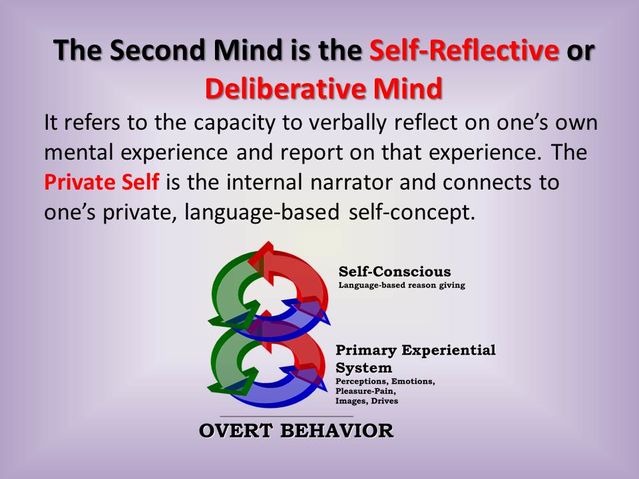
The difference between the primary mind and the deliberative mind can be considered in the difference between seeing a piece of cake and having the self-reflective, deliberative thought, “Here I am seeing a piece of cake, I wonder if I should eat it.”
A Dual Motive Conflict Approach to Addiction
If you are a dieter or have engaged in any other form of deliberative self-regulation of your urges (and who hasn’t?), you likely have an intuitive sense of what dual motive conflict theory is about. As Mark Leary describes in this course on the Mysteries of Human Behavior, he regularly would make deliberative decisions about not eating cake, only to “hear himself say yes” when at a restaurant and asked if he would like a piece of cake for dessert.
To understand why primary and secondary processes are often in conflict, we need to understand that they operate in very different ways. As the slides below indicate, the Primary Process Mind is fast, responds to fluctuating urges, responds via association and reward to stimuli and context, is habit based, and operates on a short time frame, usually of seconds into minutes.
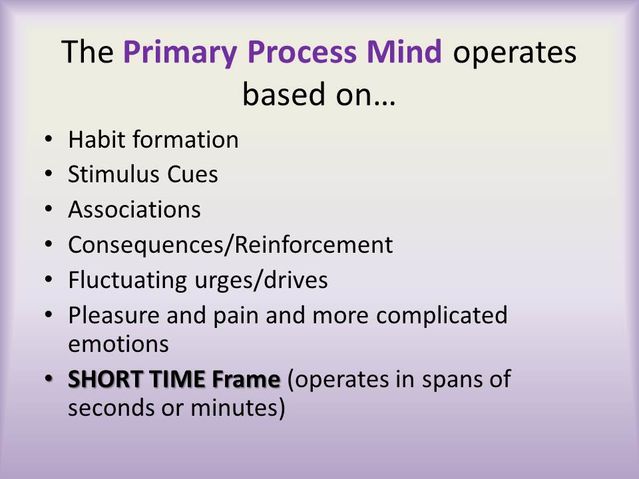
The Deliberative Mind, in contrast, operates largely with concentrated effort, uses verbal reasoning, justification and argumentation, and operates over extended time frames from minutes to days to weeks to years, even decades.
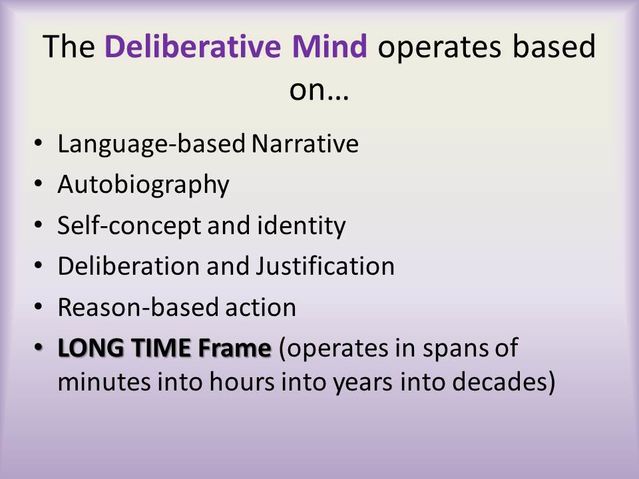
So we can now return to the example with the cake. When we are reflecting on our future and want to be trim, fit and healthy, the Deliberative Mind can easily project a month or six months into the future and imagine us looking and feeling better and thus a decision is made to not eat cake. The Primary Process Mind does not care at that point. However, a week later, when an individual is hungry, and all the stimulus cues (smell, taste, hunger, social roles, and so forth) are pointing to eat cake, then the Primary Process Mind jumps in and someone like Dr. Leary often ‘finds himself’ saying “yes, I’ll have a piece”. (Notice the frame here “finds himself” is placed as such because our “selves’ are most linked to our deliberative actor self.)
Addiction: A Primary Process Habit that Over Powers the Deliberative Mind
With this basic understanding, we are now in a much better place to understand the nature of addiction. Addiction is a state of being whereby the Primary Process Mind is overpowering the Deliberative Mind. Addictive substances, by definition, are rewarding, at least in the short term to the Primary Process System. The relaxing drag off a cigarette, the calm easy buzz after three or four drinks, the rush of a cocaine high, the painless emptiness of an opioid indulgence. Whatever it is, the primary process mind craves it.
People and contexts vary enormously in terms of what is experienced as reinforcing and why. But the fundamental essence of addiction is when the primary process pull is so insistent that it cannot be regulated in accordance with good, deliberative decision making. And so, this evolves in a way that there are serious maladaptive consequences, and the individual and important others experience much conflict and distress about it. The overpowering of the deliberative mind by the primary process mind is what is meant when an “addict” says they could not help it, but they had to act on their urges.
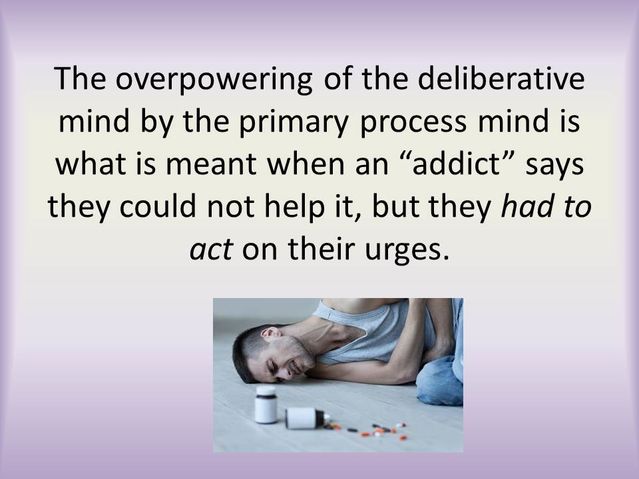
This analysis allows us to return to the question about whether or not addiction is a disease. Generally speaking, addiction is not prototype of a disease because there usually isn’t any “malfunction” of brain biology. True diseases, like cancer or heart disease, involve biological malfunctions that are deemed harmful. However, it is the case that there are important brain changes (especially with drugs like opioids), and it is often something that cannot be controlled by “the deliberative person” portion of the human mind. That this is true is evidenced by the fact that successful opioid addiction requires medication assisted treatment in the vast majority of cases.
So, an addiction is a powerful, problematic habit that activates the primary process system in a way that overrides the deliberative system. And, thus to change the pattern, systematic changes across multiple levels (e.g., environment stimulus cues, primary process activation states, bio-physiological regulation, and deliberative self-talk, and social support, other avenues for productive investment and so forth) are required.
